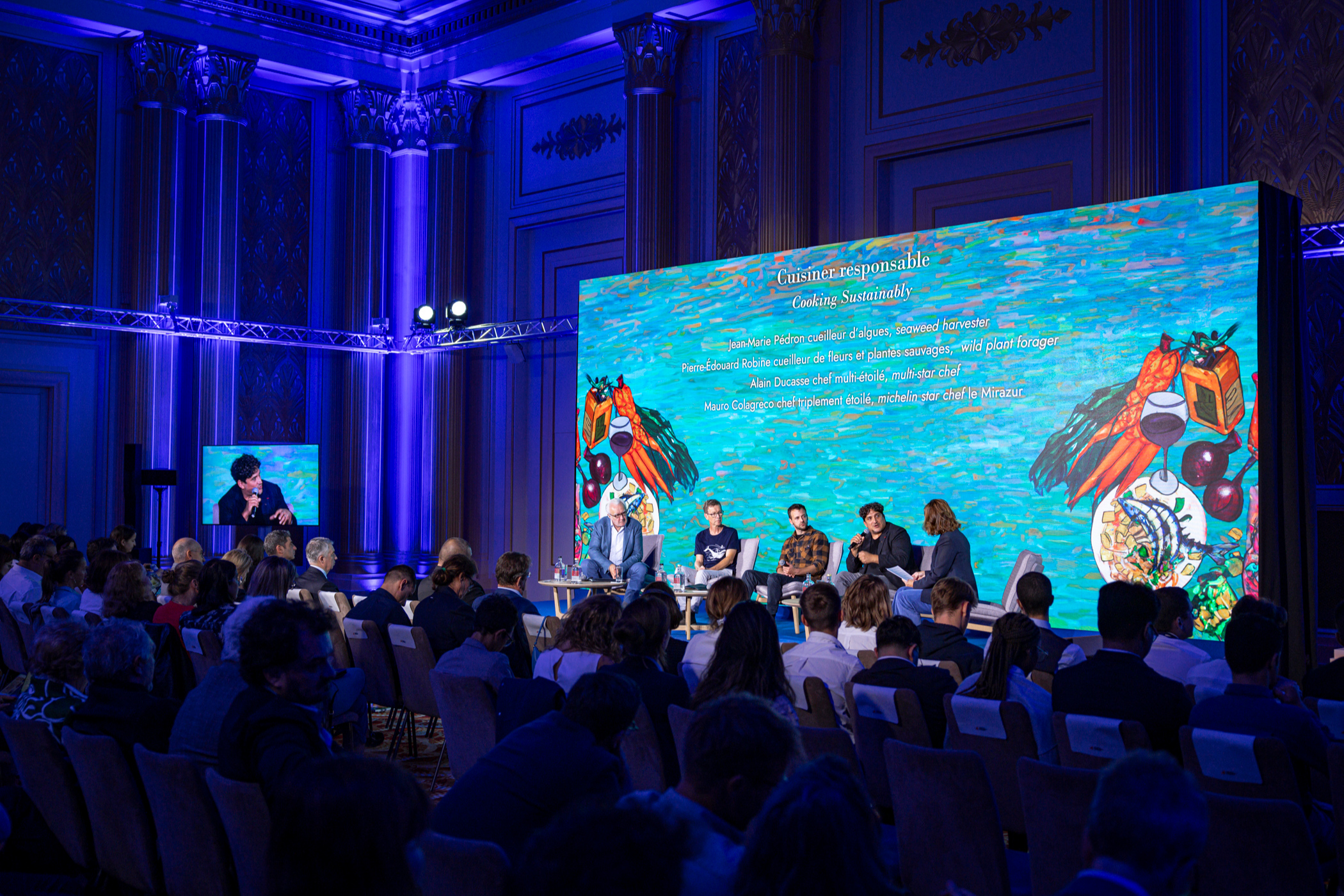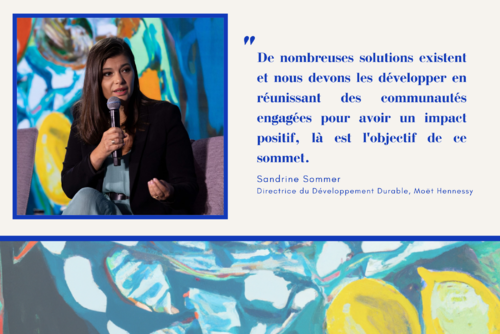
Sustainable Gastronomy Summit 2023
Gastronomy
Given that food systems are responsible for a third of greenhouse gas emissions, the fine dining sector needs to have a long, hard look at its habits and production methods. Chefs have the opportunity to act as role models in the transition towards protecting the planet and its inhabitants in the face of ecological and climate disruption. As Olivier Wenden, CEO and Vice- Chairman of the Prince Albert II of Monaco Foundation, points out: “All the different stakeholders in gastronomy have an important role to play in our transition towards sustainable, inclusive and resilient agriculture and food systems”. Exploring the food chain from our soils and seas to our plates, scientists, producers, chefs, students and environmental stakeholders shared their experiences of, and innovative solutions for, reconnecting with an approach that is more respectful of the living world, and that ensures a balance between nature’s resources at the same time as reconciling consumer expectations and economic activities. Mobilising people to make pledges and take action to create the gastronomy of tomorrow is more crucial than ever.
FARMING AND FISHING IN THE ERA OF CLIMATE CHANGE
The ocean’s key role in mitigating climate change has now been proven, points out Eva Moreno, a palaeoclimatologist at the Paris Natural History Museum, as has the need to reduce the many pressures threatening ecosystems. Small-scale fishers using practices that respect the balance of the ocean are asking to be supported by government regulations so the practices can be developed. “In the Mediterranean, we are reducing fishing areas and adapting to the fish we find, just like farmers adapt to the seasons,” Sylvain Pagnon explains. Many producers of fishery and aquaculture products have begun their transition, like Lagosta, a company that promotes organic and sustainable European lobster farming. Connecting scientists, suppliers and consumers, Ethic Ocean provides data on the exploitation status of fish species: “86% of fish on the market comes from overfishing, but scientific data enables us to make purchase recommendations for fish that aren’t overexploited,” says the company’s director, Elisabeth Vallet. Ethic Ocean’s mission is similar to that of the Mr. Goodfish initiative, which the Prince Albert II of Monaco Foundation has coordinated for the Mediterranean seaboard since 2013 and which recommends different species according to the seasons and helps consumers rediscover little-known or forgotten species. This approach is also found in agriculture; for example, Fabien Dumont, a market gardener from Saint-Rémy-de-Provence, researches vegetables that are better suited to our new climates, including heirloom varieties such as Sicilian tomatoes and round cucumbers.
ECO-CONSCIOUS COOKING
Edible algae are one solution: in addition to their multiple benefits, they regrow more quickly than land crops, as Jean-Marie Pédron explains, and are grown without fertilisers, herbicides or pesticides. And yet, despite France’s 5,500 kilometres of coastline, only 5% of the country’s seaweed is consumed todaycompared to the 1950s, when seaweed harvesting was common practice. Back on land, Pierre-Édouard Robine, a wild plant forager for leading restaurants, as well as an ecologist and ornithologist, compares his approach to haute couture. “Rather than bringing in exotic produce from abroad, you can find extraordinary wild plants at home,” explains the man who roots out his new ingredients in Écouché-les- Vallées, in the Orne department in Normandy. Michelin-starred chefs Alain Ducasse and Mauro Colagreco are firm advocates of local produce. “Not everyone can grow their own produce, but everyone can choose to work with quality small-scale suppliers,” says Colagreco, who runs the Mirazur restaurant and three-hectare garden in Menton. This belief is fundamental when it comes to training the next generation, as Ducasse explains: “We have 2,000 students around the world who are learning the art of French cuisine: cooking, sourcing responsibly, reducing waste and respecting the environment. Bringing tomorrow’s chefs on board is a way of advancing the sustainability movement.”
"Nature is my first source of inspiration. Without responsible farming and fishing, cooking loses its essence."
- Alain Ducasse
A COMMITMENT TO SUSTAINABLE GASTRONOMY
Although labels are a way for restaurateurs to demonstrate their commitment to sustainable development and give consumers new choices, says Fanny Giansetto, co-founder of the label Ecotable, these tools must be part of a broader mobilisation trend, “to help restaurants understand their impact on the environment and show them how they can adopt sustainable practices at an affordable price […] By reducing food waste, turnover can be increased by 30%,” she explains. Another example is the Michelin Green Star, which is awarded to trail-blazing chefs around the world who are the forefront of sustainable gastronomy. “We have never had as many requests from establishments as we have for this distinction. The Green Star has created a united community of restaurateurs. Diners are also championing the initiative,” says Élisabeth Boucher-Anselin, the Michelin Guide’s Director of Communications. Prioritising the same desire for quality, Terroirs d’Avenir has created a “small-scale” producers network with 300 rural farmers in France, Italy and Spain. Others, like Dieuveil Malonga, the chef at Meza Malonga and a social entrepreneur, are reviving traditions; he has spent two years travelling around the African continent to “record recipes handed down by the oral tradition and bring them to life by training aspiring young cooks”.
"We shape the world we livein by the way we choose to eat."
- Mauro Colagreco
IMPROVING FOOD EDUCATION
Educating pupils about and exposing them to a healthy and sustainable food culture gives them the knowledge and practical skills for eating and cooking in an eco-conscious way. As the main context in which pupils experience the French food model, school canteens have a duty to take these matters on board. Gilles Pérole, Deputy Mayor of Mouans-Sartoux, is an enthusiastic advocate of his project: “We couldn’t find local organic vegetables, so we decided to grow them ourselves […] Our school cafeteria is now 100% sustainable, organic and as local as possible, with the majority of produce grown on our municipal farm”. Their example is widely followed, with over 85 municipal farms in France. Meanwhile, Camille Labro launched the Edible School movement in 2009 to raise awareness among children aged 4 and 5 years old. Corinne Mbow, Elior Group Marketing Director, talks about the collective awareness that is emerging: “Our leverage is the pleasure of eating, food education, raising awareness among our children and cooking classes in schools. I think that’s how we’ll change things in the long term and influence policymakers.” Gastronomy professionals also have a role to play by adapting to changes in dietary habits. Take Cap Veggie, established by Laure Mardoc, which in 2 years has trained 600 chefs and their teams in vegetarian cooking.
WHAT DOES THE FUTURE HOLD FOR FINE DINING?
Audrey Bourolleau, founder of HECTAR, observes that agriculture has been abandoned in the farm-to-table movement to a certain extent: “Today, half of French farmland is damaged. We must switch to sustainable farming and restore dead soils. But farmers need our support. They deserve to be valued and paid fairly, and their profession should be given the status it merits”. To meet this challenge for the future, Christophe Joublin, President of the French Association of Hotel and Tourism Schools, is calling for national hotel and catering education programmes to adopt a holistic approach. He highlights the need to “build bridges between the generations” to address the issues of sustainability, nutrition, health, seasonality, responsible sourcing and waste reduction, as well as the importance of involving all stakeholders in the process. This new approach to training is already bearing fruit: Romain Guth, a student at the École Ducasse, describes how the school has eradicated food waste from the cooking equation, and Lisa L’Hostis from Ferrandi cookery school is calling for sustainability efforts to extend beyond the plate to the restaurant’s choice of construction materials and furnishings. Trends are changing, notes Manon Dugré, Coordinator of the ANCA Chair food and nutrition research unit at AgroParisTech, who comments that cooking and eating animal protein has become a social issue. “Between 1950 and 2000, meat consumption increased fivefold, while the population only doubled.” To change habits and tackle prejudices, the only option is to make sustainable cooking accessible to everyone.
Moët Hennessy, the wine and spirits division of LVMH, is intrinsically entwined with gastronomy and the culinary professions. Like the food on our plates, our products come from the land and embody a unique savoir-faire passed down for generations. Sustainability is a core part of our business model. Sustainable gastronomy has the power to transform practices to facilitate the environmental and social transition needed for tomorrow’s world. Like the World Living Soils Forum, the next edition of which will be held on 9 and 10 October 2024, the Sustainable Gastronomy Summit brings together everyone with a stake in our ecosystems, creating maximum impact.
- Sandrine Sommer, Chief Sustainability Officer - Moët Hennessy
By mobilising all the stakeholders in the agriculture and food chain, we want to make a concrete commitment to common-sense cooking.
- Alain Ducasse
Photo credit: ©Philippe Fitte / FPA2









